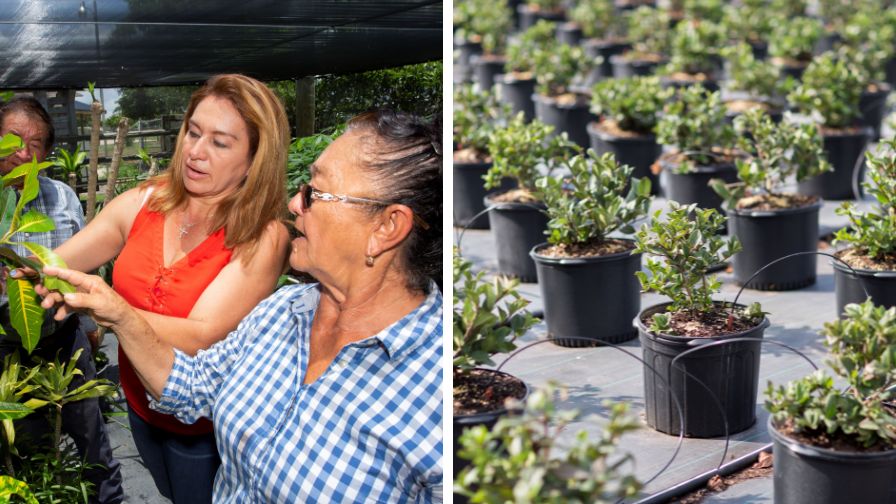[ad_1]

Nixia Martinez working in her plant nursery, Nixia’s Exotic Plants, alongside her parents (L), and potted plants in a nursery (R) | UF/IFAS, Tyler Jones
Imagine a future where nursery growers can effortlessly manage their plants with cutting-edge automation technologies, using potting or weed-spraying robots, instead of having to dig each hole or spray each pot by hand. With the help of a $9.8 million grant from the USDA National Institute of Food and Agriculture (NIFA), this vision is becoming a reality.
The University of Florida, Institute of Food and Agricultural Sciences (UF/IFAS) will use about $1 million of the grant to lead research and development to tackle the labor challenges faced by the nursery industry. UF’s role in this grant includes evaluating herbicide, pesticide, and fertilizer application equipment and testing people’s perceptions of and willingness to adopt new strategies related to automation.
The grant will address critical labor challenges within the nursery industry, says Chris Marble, Associate Professor of Ornamental and Landscape Weed Management at the UF/IFAS Mid-Florida Research and Education Center.
“The big goal is to affect change. We want growers to adopt these different automation practices, but mostly, we want to give them information to even consider these changes in the first place,” he says. “We want them to take incremental steps so they become more profitable and more sustainable, and it helps the industry as a whole.”
The nursery industry, particularly container nurseries, faces significant hurdles due to labor costs and availability. Unlike more traditional agricultural sectors that have largely adopted automation, such as peanuts, cotton, or corn, nurseries deal with a diverse array of plants, making automation more challenging.
The primary goal of the five-year grant project, led by North Carolina State University, is to explore and implement various types of automation – from timed sprayers to robots – within the nursery industry.
The project will look at the return on investment of large-scale potting machines, automated sprayers, and other innovative technologies. By incorporating the expertise of economists, engineers, and social scientists, the project will provide comprehensive solutions that are both economically viable and widely adoptable, Marble says.
UF/IFAS, via Marble, will lead the Extension efforts nationally, organizing field days across the country to demonstrate the benefits of automation. These events will provide hands-on experiences and showcase successful case studies to encourage adoption among nursery owners.
Another initiative within the project will be led by UF/IFAS Professor Laura Warner, of the Agricultural Education and Communication department, investigating the perceptions and barriers to adopting automation technologies. Understanding the concerns nursery owners and employees have with adopting new technologies, such as incompatibility with existing nursery infrastructure, is crucial for developing strategies that facilitate smooth transitions to automated systems for nursery owners and employees.
“Is there concern that different types of automation might cost someone their job? That’s what we want to find out,” says Marble.
Incremental steps, from simple upgrades like switching from granular hand shakers to sprayers to large-scale implementations of potting machines, will be explored.
At the end of the day, automation decisions must be made on a case-by-case basis, says Marble, since each nursery has unique needs and concerns. Researchers are sensitive to these needs as they proceed with the study and will incorporate these challenges into their study results.
“Each nursery is so different,” he says. “You can go to a nursery up the street and some automation might be very beneficial to them, but for the one next door, it might not make sense.”
[ad_2]
Source link

